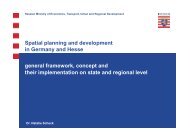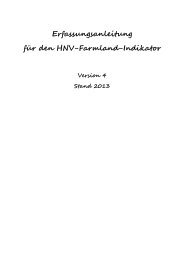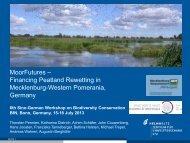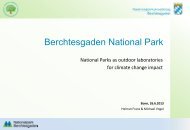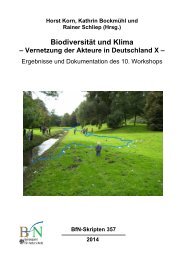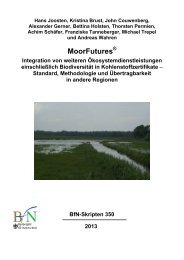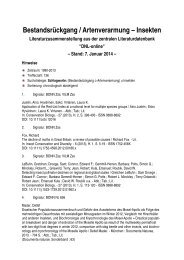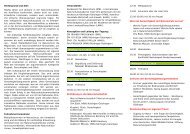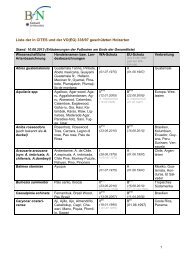Caring for Pollinators - Bundesamt für Naturschutz
Caring for Pollinators - Bundesamt für Naturschutz
Caring for Pollinators - Bundesamt für Naturschutz
Create successful ePaper yourself
Turn your PDF publications into a flip-book with our unique Google optimized e-Paper software.
Ssymank, Hamm, Vischer-Leopold & Wittmann Introduction<br />
The plan has four elements: assessment, adaptive management, capacity building and<br />
mainstreaming, each with a detailed operational objective, rationale, activities, ways and<br />
means and a timing of the expected outputs.<br />
A series of international and national activities has been organized to conserve and sustain<br />
the use of pollinators, and to maintain or restore their habitats (African <strong>Pollinators</strong> Initiative,<br />
Brazilian <strong>Pollinators</strong> Initiative, European <strong>Pollinators</strong> Initiative, North American <strong>Pollinators</strong><br />
Protection Campaign and Oceania <strong>Pollinators</strong> Initiative). Each initiative has the aim to integrate<br />
and co-ordinate local, national and international activities relating to pollination into a<br />
cohesive network.<br />
Furthermore there is a UNEP/GEF project “Conservation & Management of <strong>Pollinators</strong> <strong>for</strong><br />
Sustainable Agriculture through an Ecosystem Approach” witch will contribute to the conservation,<br />
sustainable use and management of pollinators <strong>for</strong> example by developing and implementing<br />
tools, methodologies, building local, national, regional and global capacities to<br />
enable the design or promoting the coordination and integration of activities related to the<br />
conservation and sustainable use of pollinators at the international level to enhance global<br />
synergies.<br />
As the following pages will show, there is a growing number of research and activities to<br />
maintain pollination services. However there is still a long way to go with research, networking<br />
and in<strong>for</strong>mation transfer, political awareness and pollinator management as core activities<br />
to maintain biological diversity worldwide.<br />
We may hope that pollinators will be kept in our minds. We need them and we<br />
need to care <strong>for</strong> them!<br />
Citations:<br />
FAO (2008): A contribution to the International Initiative <strong>for</strong> the Conservation and sustainable Use of<br />
<strong>Pollinators</strong>. – Rapid Assessment of Pollinator’s Status. January 2008, 52 pp., FAO, Rome.<br />
GALLAI, N., SALLES, J.M., SETTELE, J. & VAISSIÈRE, B. (in press): Economic valuation of the vulnerability<br />
of world agriculture confronted to pollinator decline. Ecological Economics (in press;<br />
doi:10.1016/j.ecolecon.2008.06.014).<br />
NABHAM, G. P. & BUCHMANN, S. L. (1997): Services provided by pollinators. In: Nature´s services (ed.<br />
Daily G.), pp. 133-150. Island Press, Washington D.C.<br />
SPRENGEL, C. K. (1793): Das entdeckte Geheimnis der Natur im Bau und in der Befruchtung der Blumen.<br />
– Berlin (F. Vieweg).<br />
3





